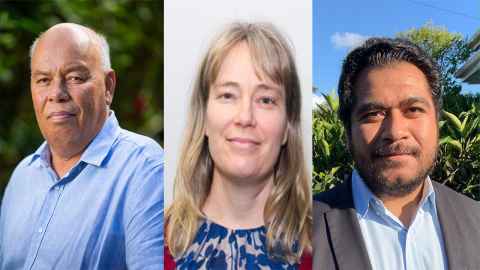Taking Issue: Is New Zealand a more cohesive society since Covid-19?
25 May 2021
Opinion: Three Auckland academics give their views on the question of whether we are a more cohesive society thanks to the pandemic.

Foundations were laid long ago. says Dr Collin Tukuitonga, Associate Dean Pacific, Faculty of Medical and Health Sciences
Despite dramatic shifts in national priorities and the gap in wealth that is increasing over time, New Zealand continues to value community and the needs of the group over personal and individual benefit. Most citizens believe in supporting the most vulnerable members of society and sharing the cost of doing so.
It could be said resurgence of te reo Māori and influence of Māori values has helped consolidate the importance of community and the well-being of whānau and the collective over individualism and private value.
The public health threat of Covid-19 and knowledge of the catastrophic impact of the pandemic on other countries has further reinforced this shared commitment to supporting the well-being of the larger group.
Most people have been willing to safeguard the wider community by practising well-publicised public health measures such as social distancing, coughing etiquette and home isolation when advised. Clear messages of kindness for one another from the Prime Minister have helped secure this adherence to public health advice and increased our sense of social unity.
So, in short, I do believe we are a more cohesive society because of Covid-19.
That we can say this should really come as no surprise. In the late 1800s and early 1900s, New Zealand was described as the “social laboratory of the world” for liberal reforms that eventually led to the Social Security Act of 1938.
This Act, with its free healthcare and welfare benefits, was the first social security system in the world and protected New Zealand citizens ‘from the cradle to the grave’.
A survey for the Royal Commission on Social Policy in 1987 revealed most of the population was happy to pay taxes that supported communal health, education and welfare.
The same survey indicated the belief that looking after the next generation is a joint responsibility between parents and society, with taxes paid to help bring up children we collectively want and need.
It is onto these foundations of traditional New Zealand values that our response to Covid-19 has landed, adding unity and strength and creating a more cohesive society.
New Zealand continues to value community and the needs of the group over personal and individual benefit.

Instead of sharing the burden of Covid-19, our policies have increased the load on those already disadvantaged by existing gender and ethnic discrimination.
The feeling is they're on a benefit, so not part of the team, says sociologist Associate Professor Louise Humpage, Faculty of Arts.
New Zealand is not a more cohesive society as a result of Covid-19, because our benefit policies have strengthened existing inequalities.
The government responded to significant job losses because of Covid-19 with a new payment that actively discriminates against people who received a benefit prior to the pandemic. The Covid-19 Income Relief Payment (CIRP) is paid at $490 a week tax-free (if an individual was in full-time work) for 12 weeks and without reductions if a partner’s income is below $2,000 a week or if the individual has accumulated assets.
In contrast, the existing Job Seeker Support was $250 a week before tax for a single person over 25 when CIRP was introduced, with other sources of income immediately reducing the payment.
This policy ignored recommendations made by the Welfare Expert Advisory Group to significantly increase main benefits to reduce material hardship and suggested CIRP recipients were more ‘deserving’ than other unemployed people.
My recent interview research found existing benefit recipients described CIRP as “a kick in the gut”, “a slap in the face”, an “insult” and proof that benefit recipients are not considered “part of the team of five million”.
Inadequate core benefit rates matter because women, many responsible for children, are more likely to become unemployed because they work in industries most affected by the pandemic. Yet the Labour Government’s ‘shovel ready’ projects, aiming to stimulate jobs in the construction, forestry, electricity, gas, water and waste industries, favour male workers.
Higher rates of unemployment are also common in industries with a disproportionate number of Māori and Pacific workers, yet we have seen little interest in culturally specific stimulus packages.
My interview participants described life on a benefit as a “daily grind” that is “soul destroying”, makes them “feel like shit” and destroys their mental health.
This is what those newly unemployed women, Māori and Pacific peoples face once they have completed their 12 weeks on CIRP. Instead of sharing the burden of Covid-19, our policies have thus increased the load on those already disadvantaged by existing gender and ethnic discrimination.
So while Covid-19 made Aotearoa look like 'the team of five million', an equity-focused lens would find that the only area ‘cohesion’ has increased is among our wealthy, Pākehā-majority conservatives.
There's more cohesion because there's more inequality, says Dr Dylan Asafo from the Faculty of Law.
Aotearoa New Zealand appears to be a more cohesive society because of Covid-19. But this ‘cohesion’ isn’t a good thing, especially in a deeply unequal settler-colonial state like this one.
Pseudo-collectivist rhetoric such as “the team of five million” was, and still is, effective in encouraging nationwide compliance with stay-at-home orders to stop the spread of Covid-19.
However, it also paves over the fundamental colonial cracks in this country, making it harder for those major divisions to be identified and reckoned with. The warm calls for unity and the continuous global praise make it hard to scrutinise and prevent state actions that fail to address the disproportionate impacts of Covid-19 on Māori, Pacific and other marginalised communities.
These include, but are not limited to, the government’s two-tiered benefit system that punishes beneficiaries, and its wage subsidy scheme that allowed some businesses to remain hugely profitable despite large-scale redundancies.
Furthermore, due to its widely praised public health response, the Labour-led Government was able to gain more support than ever in the 2020 election. Former National and New Zealand First voters, concerned with their parties’ incompetence and lured by the government’s relative competence and their increasingly conservative, neoliberal policies, gave their votes to Labour to give it an unprecedented mandate in Parliament. So while Covid-19 made Aotearoa look like “the team of five million”, an equity-focused lens would find that the only area ‘cohesion’ has increased is among our wealthy, Pākehā-majority conservatives, thus allowing a settler-colonial government to further consolidate its power. As a consequence, pre-existing, deficient institutions in our welfare, health, housing, education and criminal justice systems continue to fail our most vulnerable.
True societal cohesion in Aotearoa New Zealand can be achieved only by the state honouring Te Tiriti o Waitangi through constitutional transformation. At the very least, true cohesion demands the return of stolen land to tangata whenua and a significant redistribution of wealth from our wealthiest 10 percent, who own 59 percent of all the country’s assets, to the poorest 50 percent who only own two percent.
Covid-19 is unlikely to be a factor in making this happen. Only the will of the people can.
The writers’ views reflect personal opinions and may not be those of the University of Auckland.
This opinion piece first appeared in the Taking Issue section of Ingenio Autumn 2021.
What do you think? Email: ingenio@auckland.ac.nz